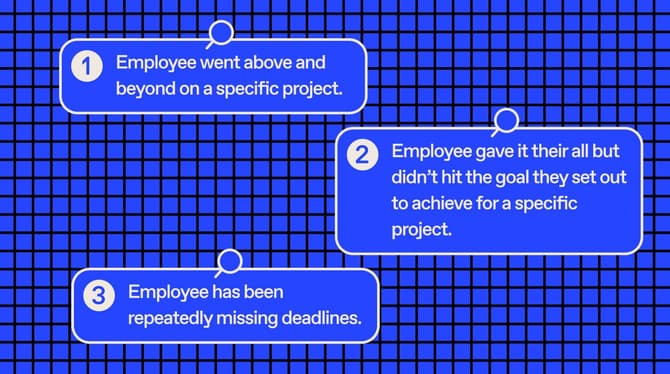You know what's really boring, those surveys that companies force their employees to do a couple times a year.
There are a couple of flaws in the way that the current system is set up that really don't allow for management to get the most out of employee surveys, not to mention that some don't strategize before, during, and after they implement surveys within their workplace.
We've found some pretty mind-blowing stuff around employee surveys that will make you think twice before just shelling out any random survey to your employees, along with a solution to get the same information faster.
Check it out:

1. Managers think they're useless
¼ think managers view surveys as a “tick-box” exercise
The verbiage used here might've been a tad bit confusing, but the context in which it's being used within the study shows that managers just see surveys as a "busy-work" task.
Meaning that it doesn't have any concrete value and it's just a way to make employees do something. Which is in our opinion not cool. If you're sacrificing your time and well-being to be at work, you shouldn't be bombarded with something that's not useful.
Employees and leadership have to come up with some form of agreement in order to create an understanding with one another that the surveys are going to be used for good and that good will come from having the employees complete them. Especially if it's going to be an in-depth survey that'll take 20-40 minutes.
2. Employees don't like answering them
30% is the average response rate despite all the costs and efforts to administer employee surveys
Quite frankly, employees feel as if those dreaded surveys are indeed busy work.
So much so, that even with all the time consumed in creating a plan around them, they still won't take the time to complete them for their managers.
The best way to go about this is to create a better experience around employee surveys that will make it a better visual experience, instead of just having to click buttons that say disagree all day.
3. People abandon them!
20% abandon rates for surveys that take more than 7-8 minutes to complete
Even when you reel them in, you can't even get your employees to take those surveys.
This is sadly because surveys are still kind of boring. That's why we're working on coming up with a new way to survey your employees that'll make your employees want to provide more information to their managers.
The best way to combat this is to either make them less redundant and ask for more written feedback from the employees. That's right, when you make these surveys put less emphasis on ABCD answers and allow for written responses. It'll provide more valuable feedback.
4. People think employee surveys are pointless
29% of employees thought they were pointless
People think employee surveys are pointless and it's not just employees, it's managers as well.
A poorly strategized employee survey plan can lead to negative feedback from managers and employees alike. It's things like this that give surveys and employee appraisals a bad reputation.
Make sure you have a plan already in place for the projected results that you are expecting. If you feel like your employees are dissatisfied or need you to be a better boss, have an action plan ready so you can execute.
5. No results come out of them
Only 1/5 believe their manager would act on what came up in the survey
Speaking of employee survey results, employees don't feel as if managers wouldn't even act upon what they got in the survey. It's one thing to obtain the results, but it's a whole other ballgame to put the results to use.
Remember, when you're planning out a survey, think about the endgame and what's going to happen after the fact. It's one thing to conceptualize all the questions and see the numbers behind everything, but it's another thing to actually do something with them.
6. No following up on results
20% said their boss never bothered to follow up any concerns raised.
I guess you can say that this is the theme of our research, managers aren't doing anything with the information and it's making them look really bad.
The last thing you would want is to be considered a horrible boss because you're not applying your work to make the office better.
So be a part of the 80 percent that want to create a better workplace and want to do things the right way. Follow up on your surveys and appraisals.
7. Managers don't focus on improving from it
47% of managers say that they spend only two to five days a year on activities relating to their annual engagement survey.
Improving the office doesn't depend on a couple of surveys, appraisals, or team building activities that will make your office better.
8. Target response is a bit tricky
60%-80%: a good target for the response rate on the employee survey. under that, you don’t have enough data. Above that you probably cheated the participation with too many incentives…
Trying to engage 60-80% of people and have them participate on a survey is nearly impossible. Especially when you have a larger team.
So any time you've heard of someone with a 90% participation rate, it's absolutely false and they've done something to cheat the system. Try and have realistic expectations for your surveys and try to get the best results without necessarily having to beg for it.
You'll get unbiased and accurate survey responses in doing so.
9. Some managers don't look at the results at all
27% of managers never review survey results at all
Going back to what we had mentioned before, managers will often just ignore the results from employee surveys and go on their gut feeling instead of make decisions based off of data.
If there's a major no-no, is to ignore the results. Of course, every now and then, you'll have a case where a gut-feeling or guess will work, but when the numbers and results are in your face, you should probably go with it.
10. No action taken
52% reviewed survey results but took no action
One of the reason surveys aren't popular is because that nothing comes out of them. What good is it to do these kind of things and waste time, money, and resources, if nothing will come out of them.
If you're an employee (or group of employees) don't be scared to ask about the possible outcomes of completing one of these surveys and how long it'll take for something to happen.
Remember, it's your time that's being taken up to complete these things.
11. Is the information valuable or not?
48% of senior managers reported the surveys were highly valuable 45% of employees say surveys had little or no value
Here's something from both ends of the spectrum, senior managers think that the results are valuable, whereas the employees don't. I should also add that less than half of managers think that the information is valuable, and less than half of the employees say they have small.
This kind of information make is like hearing about a tie in a gunfight. No one really knows if the information is valuable, employees and management alike.
Why not make surveys a collaborative effort between both employees and managers? They both want to make the office better, so try creating surveys that will make the information valuable for both parties instead of one.
12. Dissonance between employees and management
52% of senior managers felt it provided very accurate assessment; 48% of employees felt the surveys did not provide an accurate assessment
So how accurate are surveys? We've hit another stand still as both managers and employees feel that they don't provide an accurate assessment of how they feel.
But as you've seen with the previous statistics a lot of people don't really like them and they won't really provide accurate results.
Aside from making a killer employee survey tool, we're planning on reinventing the way employee surveys are strategized and making them easier for both the employee and manager. So let's start creating better workplaces.
What are your thoughts on employee surveys?
Do you think employee surveys are a useful tool for your office? If so, how can they be made better and what can be done to make the information more valuable. Let us know your thoughts on twitter @Officevibe.
Equip HR and managers with tools to engage, recognize, and drive performance.




